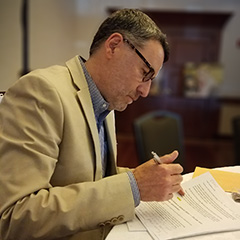Can We End the Crisis of Agency?

Topics
Column

Do you feel more or less in control of the world than you did five years ago?
This is a question I have been discussing with researchers, authors, executives, and others I encounter in my life as editor of MIT Sloan Management Review. You will not be surprised that the majority answer “less,” usually without hesitation and often quite adamantly.
I set the time span of five years for the question so it is not directly tied to the Trump presidency or Brexit, although it’s hard to imagine those developments are not central in many people’s answers.
The last five years have also seen the rise — at least in our consciousness — of several other phenomena that threaten our sense of agency.
Perhaps most obviously, the climate change conversation has taken a dramatic turn. We have reached a point where any rational, thinking human cannot help but be, well, terrified. Among all the things we may feel powerless against, the impact of an increasingly angry planet sits high on the list. Public discourse has evolved from “if” to “when,” and the question of “when” from centuries to decades to years.
Within this same half-decade, we have experienced a sharp turn in our feelings about intelligent technology. The cresting digital wave circa 2014 that we associated with freedom of expression, access to information, and promise of a hassle-free lifestyle has crashed into fears for our privacy, anxiety about replacement, and an absurd twist on the search for truth. We techno-optimists find this particularly distressing, as technology should be a source of great empowerment across our work and home lives and across economic boundaries.
As humans, we are all prone to bouts of exceptionalism. We get caught up in the moment and fool ourselves into believing we are experiencing something truly unprecedented. Later, with the benefit of perspective, we recognize that others have seen or experienced the same thing before.
Email Updates on the Future of Work
Monthly research-based updates on what the future of work means for your workplace, teams, and culture.
Please enter a valid email address
Thank you for signing up
I am certainly exceptionalism-prone, so I have challenged myself to look at history for context. Indeed, there is strong and near-term precedent for the type of angst we are experiencing. Consider how humankind reacted in the moment to the upheaval of the Nixon administration, for example, and to pretty much every major technological transformation of the industrial age.
But we’ve reached a new level of angst. Taken together, today’s attacks on our sense of personal power — across all walks of our lives and our economy — amount to a crisis of agency.
I feel no pity for myself, nor do I have overwhelming sympathy for any other “have” in this world. I can only imagine how our feelings of discomfort pale in comparison to the stresses of simply trying to survive and put food on the table.
But shrugging our shoulders and accepting anxiety and impotence as the new normal is a sure road to disaster. We cannot let threats overwhelm or inhibit us, no matter how existential they may appear.
The answer, I think, is to do what’s within your immediate power — and do it right now. Do that thing you can do today that makes a positive contribution. Maybe that’s making a financial contribution to a nonprofit organization or a political campaign. Maybe it’s taking the bus to work instead of driving, skipping meat for a meal, or staying off Facebook for the rest of the day.
Or maybe it’s seizing on the opening provided by the long overdue change in guidance from the Business Roundtable. Take five minutes and write the first paragraph in a memo outlining the change in strategy you’ve been contemplating. Your expanded set of stakeholders recognizes what’s at stake.
While some of these actions may border on the trite, doing small things can make you feel more powerful. And you know what they say about a taste of power.
